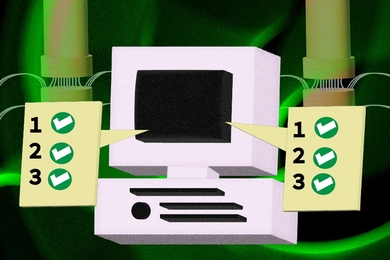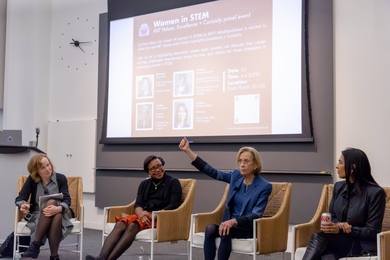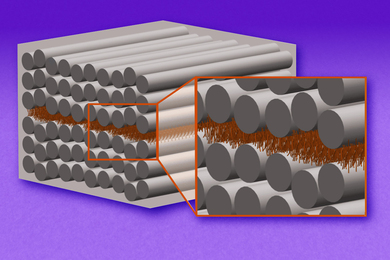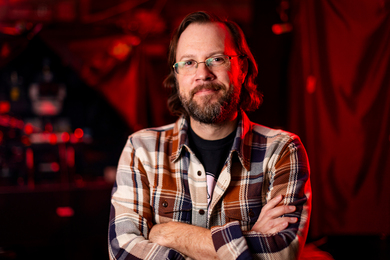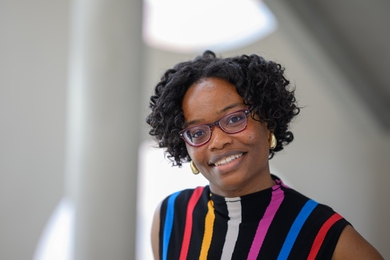American composer and musical innovator Steve Reich, one of the founding fathers of minimalism, will be in residence at MIT from March 19-23 as the 1995 William L. Abramowitz guest artist.
Mr. Reich, whose pulsing, hypnotic compositions have influenced the development of both rock and modern classical music and made their way into mainstream concert programs, will work with students and faculty in the music section and participate in two free public events.
The headline event, An Evening with Steve Reich, will take place on Wednesday, March 22, at 8pm in Kresge Auditorium when the composer joins MIT students and Evan Ziporyn of the music faculty in a concert of Mr. Reich's compositions. The program will include Music for Pieces of Wood (1973); Music for Mallet Instruments, Voices and Organ (1973); New York Counterpoint (1985); and Different Trains (1988), winner of the 1990 Grammy Award for best contemporary composition. Following the performance, Mr. Reich will entertain questions from the audience.
On Tuesday, March 21, at 8pm in the Bartos Theater, Mr. Reich will show film clips and discuss his groundbreaking multimedia work, The Cave, created in collaboration with his wife, video artist Beryl Korot. The Cave, a large-scale music theater piece, pairs digital technology with biblical themes in a postmodern attempt to explore the Arab-Israeli conflict. Calling the work "part MTV, part documentary, part music theater," K. Robert Schwarz of The New York Times wrote that The Cave represents "one of the most radical redefinitions of opera the waning century has witnessed." The work premiered at the 1993 Vienna Festival and 1993 BAM Next Wave Festival.
Fifty-five MIT students, coached by Professors Ziporyn, Marcus Thompson and David Epstein, have been preparing the challenging parts to Mr. Reich's works since last September. While at MIT, Mr. Reich will supervise rehearsals of the pieces and speak to students in composition and western music classes.
Electronics and sampling technology are at the core of Mr. Reich's breakthrough composition, Different Trains. Written for the Kronos Quartet and to be performed by MIT students in the March 22 program, the work calls for a live quartet of musicians accompanied by three other quartets on tape, along with train sounds and sampled fragments of speech. Different Trains was inspired by train journeys Mr. Reich made across the United States as a small child; the title refers to contrasts between these journeys and those taken by European Jews to Nazi death camps during this same period. The words "haunting" and "mesmerizing" have been used to describe the piece, hailed by The New York Times for its "absolutely harrowing emotional impact."
In the mid-1960s Mr. Reich began investigating the musical effects of repeated patterns that incorporate gradual changes over an extended period of time. His exploration of such music has grown increasingly complex over the years, influenced by his studies of nonwestern music: African drumming, Balinese gamelan and Hebrew cantillation. In 1966 he founded his own ensemble of musicians, which has since grown from three to 18 members or more. By the 1980s, Mr. Reich had emerged as one of the central influences in experimental music and a source of inspiration for avant-garde rock musicians like David Bowie and Brian Eno. As his works found favor with general audiences, Time magazine was prompted to proclaim that "minimalism. has come uptown at last."
Many of the students participating in the March 22 performance are also members of MIT's Gamelan Galak Tika, founded and led by Professor Ziporyn, who, like Mr. Reich, has been influenced by Balinese gamelan in his work as a composer. Other faculty members with links to Mr. Reich include lecturer and soprano Pamela Wood Ambush, who has premiered and recorded Mr. Reich's works.
Mr. Reich's residency and public programs are sponsored by the William L. Abramowitz Guest Artist Series, the Office of the Arts, and the Music and Theater Arts Section in the School of Humanities and Social Science. For event information, call x3-4003.
A version of this article appeared in MIT Tech Talk on March 15, 1995.

